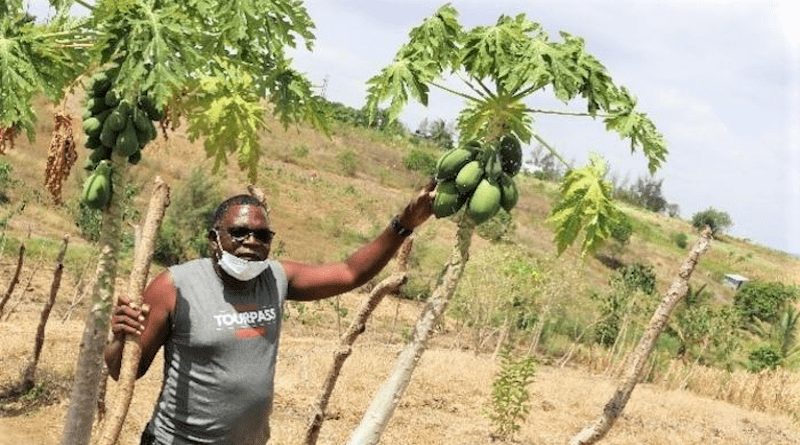New Study Reveals Willingness Of Papaya Farmers In Kenya To Reduce Pesticide Use
A new study published in the CABI Agriculture and Bioscience journal has revealed a willingness of smallholder papaya farmers in Kenya to reduce their chemical pesticide use to fight the papaya mealybug (Paracoccus marginatus).
Researchers from CABI surveyed 383 farming households in four counties in Kenya alongside key informant interviews with eight extension agents and thirty agro-dealers, and eight focus group discussions.
They found that in a desperate attempt to control invasive alien pests’ farmers often resort to the use of broad-spectrum insecticides even though biological control is a more sustainable method of pest management that is extremely suitable in the smallholder production context found in Sub Saharan Africa (SSA).
Kate Contstanine, Project Scientist at CABI and lead author of the study, said, “In SSA few attempts using biological control for arthropod pests have been successful, with one of the key reasons cited as poor involvement of farming communities and extension in the dissemination of information.
“As a transboundary problem, invasive species present a social dilemma since, for an optimal outcome to be achieved for all affected people, a collective management response is required.”
The scientists sought to determine smallholder farmers’ knowledge, attitudes and practices towards biological control; farmers’ willingness to reduce their chemical pesticide use; and levels of support for a classical biological control (CBC) programme for papaya mealybug in Kenya.
They also found that there were high levels of awareness of the negative impacts and risks associated with chemical pesticides on human health and the environment.
Farmers demonstrated some awareness of the concept of biological control but they lacked knowledge, experience and technical support from extension or agro-dealers. Reasons for not using biological control included inadequate awareness and concerns over efficacy and safety.
Ms Constatine added, “Farmers expressed high levels of interest and willingness to support a classical biological control programme.
“Importantly, most farmers were willing to reduce their chemical pesticide use to conserve the parasitoid biological control agent, Acerophagus papayae, and there were indications of the requirements for collective community action.
“Previously, poor attention has been paid to farmer participation, inclusion and social factors in biological control, which has resulted in limited success in developing countries.
“Both farmers and extension personnel highlighted the importance of engaging with the community at the beginning of any initiative to ensure community ownership as well as long-term sustainability.
“The next steps include targeted awareness-raising, capacity building and effective information dissemination.”
The scientists also say that their research demonstrates significant differences in farmer perceptions between counties and gender which are helpful in focussing resources going forward.
For instance, more men perceived biological control to be useful and necessary than women, suggesting a need to increase women’s awareness and understanding of biological control.

